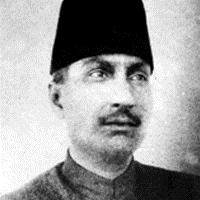Profile of Fani Badayuni
Pen Name : 'Fani'
Real Name : Muhammad Shaukat Ali KHan
Born : 13 Sep 1879 | Badayun, Uttar pradesh
Died : 27 Aug 1941 | Hyderabad, Telangana
Relatives : Arzoo Saharanpuri (Disciple), Tabish Dehlvi (Disciple)
har nafas umr-e-guzishta kī hai mayyat 'fānī'
zindagī naam hai mar mar ke jiye jaane kā
har nafas umr-e-guzishta ki hai mayyat 'fani'
zindagi nam hai mar mar ke jiye jaane ka
Born Shaukat Ali Khan at Islam Nagar in Badayun district, Fani Badayuni (1879-1941) hailed from a family that had migrated to India from Kabul during the reign of Shah Alam and received huge favours in terms of power and material possessions. His father, however, did not see the glory of his ancestors and had to join government service and work in the police force. Fani got the degrees of Bachelor of Arts in 1901 from Bareilly College and Bachelor of Laws in 1908 from Aligarh Muslim University. Subsequently, he started practicing law but did not do quite well. He shifted to Agra in 1923 and continued his practice there for another nine years with short stints of legal practice in Badaun and Bareilly. Unable to sustain in the profession any further, he moved to Hyderabad at the invitation of Maharaja Sirkishan Prasad in 1932 and worked there as a head teacher and continued working till 1939. After that he remained unemployed. Added to his professional disappointments, were the demise of his daughter and wife with which he shrunk in his own shell without seeking favours from any quarters, or stooping low before anyone. A forlorn man, he expressed himself rather unreservedly, “I have been a disgrace to my family, a burden on this earth; my existence cannot be of any use to anyone; it is of no use even to me.” Fani met his end in Hyderabad where he lies buried.
Fani is supposed to be a poet of pain and pining like Meer and compares well with him in the way he imparted a touch of existential angst to his poetry and brought a touch of genius to it. He completed his divan quite early in his life at the age of twenty or twenty two and the second one at twenty seven. However, these works were lost for good. It was only his later work that was put together in his collections Diwan-e Fani, Baqiat-e Fani, and Irfaniyaat-e Fani. His poetry is remarkable for its rich ambiguity, precision of expression, and spontaneity of tone.

